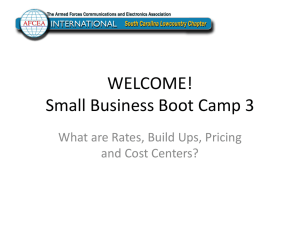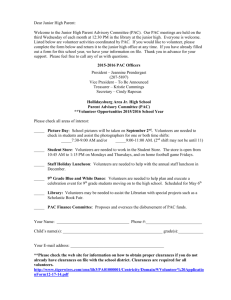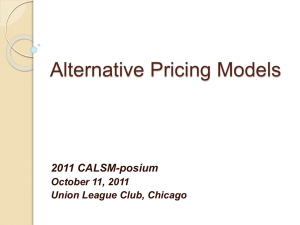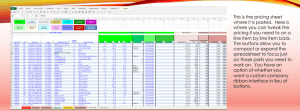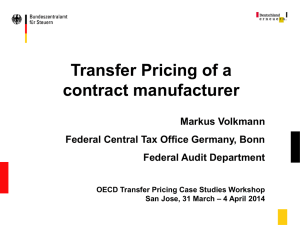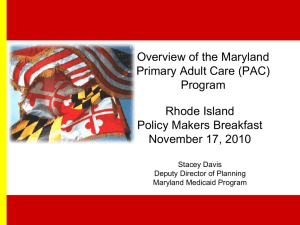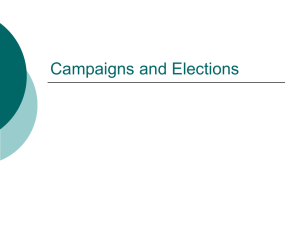Compliant Proposal Guide
advertisement
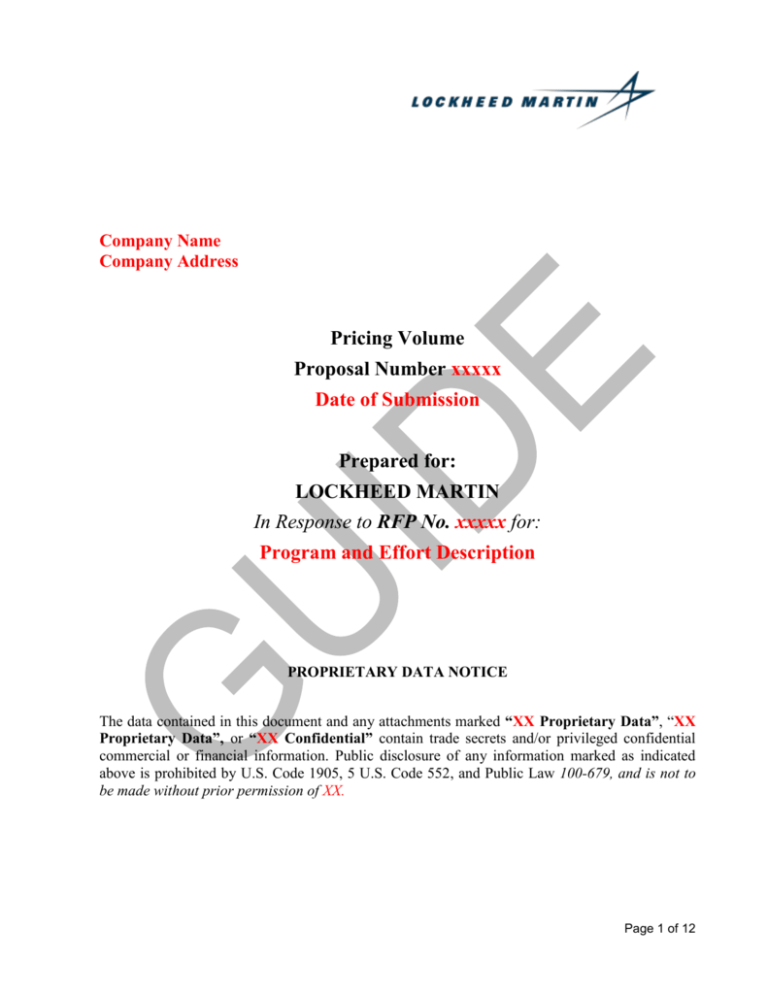
Company Name Company Address Pricing Volume Proposal Number xxxxx Date of Submission Prepared for: LOCKHEED MARTIN In Response to RFP No. xxxxx for: Program and Effort Description PROPRIETARY DATA NOTICE The data contained in this document and any attachments marked “XX Proprietary Data”, “XX Proprietary Data”, or “XX Confidential” contain trade secrets and/or privileged confidential commercial or financial information. Public disclosure of any information marked as indicated above is prohibited by U.S. Code 1905, 5 U.S. Code 552, and Public Law 100-679, and is not to be made without prior permission of XX. Page 1 of 12 The purpose of this Compliant Proposal Guide (CPG) is to provide Lockheed Martin’s subcontractors that have proposals over the Truth in Negotiations Act (TINA) threshold a reference to aid them in providing compliant proposals. This document is not a template or required format. All of the numbers and attachments included in this guide are fabricated for the purposes of illustrating to a supplier the required details expected within a TINA proposal. Therefore, none of the numerical values or estimating methodologies used in this example guide refer to past, present, or future events within or outside of the Lockheed Martin organization. These examples are purely fictional and should be regarded as such. The CPG is built as an aide to the Proposal Adequacy Checklist (PAC). The item numbers in the PAC are referenced throughout this document. As each proposal varies depending on specifications required, it is important that the submitted proposal be fully compliant with Federal Acquisition Regulation (FAR) Part 15, the Request for Proposal (RFP), and the Subcontractor Statement of Work (SSOW), in addition to the PAC. Simply replicating the examples below will not ensure proposal compliancy. Page 2 of 12 TABLE OF CONTENTS 1.0 Executive Summary................................................................................................................. 4 2.0 Proposal Information ............................................................................................................... 4 3.0 Proposal Disclosures ............................................................................................................... 5 4.0 Rates and Factors ..................................................................................................................... 5 5.0 Subcontracts ............................................................................................................................ 6 6.0 Inter-organizational Transfers ................................................................................................. 6 7.0 Pricing Instructions .................................................................................................................. 6 8.0 Attachments and Descriptions ................................................................................................. 6 9.0 Outer-Year Burden & Direct Rate Submission ....................................................................... 7 10.0 Cost Elemental Breakdown (CEB) .......................................................................................... 8 11.0 Termination Liability and Expenditure Profile ....................................................................... 9 12.0 Cost Accounting Standards Notices and Certification (RF540) .............................................. 9 13.0 Basis of Estimates (BOEs) .................................................................................................... 10 14.0 Profit ...................................................................................................................................... 10 15.0 Current Cost or Pricing Data ................................................................................................. 12 Review FAR Part 15, the RFP & Pricing Instructions, and the Proposal Adequacy Checklist attached below prior to completing your proposal. This Guide is built in support of FAR Part 15 and the PAC but is not comprehensive. Click the links below to be taken to the reference point in this document for each item number in the Proposal Adequacy Checklist. Proposal Adequacy Checklist Linked Item Numbers #1 #2 #3 #4 #5-6 #7-9 #10-11 #12 #13-16 #17-18 #19-25 #26-39 Page 3 of 12 1.0 Executive Summary Include a brief company background and your history with this effort. 2.0 Proposal Information Validity Insert validity date. Type of Contract Insert type of contract. Payment Terms/ Structure Insert proposed payment terms. Period of Performance Indicate which calendar is utilized in this proposal. Authors of Proposal Insert names and contact information. Personnel Authorized to Negotiate Insert names and contact information. Page 4 of 12 3.0 Proposal Disclosures Refer to Item # 2 of the PAC. Include any disclosures that may impact cost or pricing data. 4.0 Rates and Factors Describe your current rates and factors status or Basis of Estimate (BOE). Note that it is not mandatory to submit discrete rates and factors to LM; however, hours and cost per category are required. Attached below is an instructional PowerPoint on budgets and forecasts that can aid in formulating compliant rates and factors. Budgets and Forecasts Consistent with FAR Part 15.4, the following supporting data is required for your proposal response to be considered compliant: Identification of the proposed direct and indirect rates, their derivation, and appropriate explanation. - FAR clause 15.408, Table 15-2, II.B and C requires a time-phased (e.g., monthly, quarterly, etc.) breakdown of labor hours, rates and costs by appropriate category. The use of flat-lined rates is prohibited. For each year included in the proposed periodof-performance, the rates utilized must be supported by a discrete sales forecast and detailed firm/budgetary data in order to provide a solid basis for evaluating their overall reasonableness. An appropriate explanation of how the proposed rates were derived for each year should also be provided. The basis of the proposed indirect expense rates including overhead, general and administrative, material handling, and fringe benefits. Required support for all companies is at least the current year detailed operating budget and a long range forecast/strategic plan covering all periods of performance. Support also includes comparisons by year of projected overhead expenses by account to prior years’ incurred amounts. Out-year projections should be supported by the contractor’s analysis of the impact on its rates based on its long range forecast/strategic plan. Verify that your proposed rates and factors in outer years are based on budgeted and forecasted rates in your proposal. Page 5 of 12 5.0 Subcontracts Refer to Items #13-16 of the PAC. 6.0 Inter-organizational Transfers Refer to Items #17-18 of the PAC. 7.0 Pricing Instructions Ensure that your proposal meets all requirements of the documents listed below. Request for Proposal Does the proposal reflect all specific requirements established by the Buyer in the RFP, Pricing Instructions, or other controlling documents? Supplier Statement of Work Is the proposal compliant with all requirements of the SSOW? 8.0 Attachments and Descriptions Include the following documents in your proposal. Some examples are included below for your reference. All numbers included are derived solely for the purpose of illustrating the process. Description Signed Cost/Price Proposal Cover Page – Customer Schedule (Attached is a sample cover page. This format is not required) Refer to Item # 1 of the PAC. File Proposal Cover Page Example Pricing Summary Include pricing with the differentiation for recurring and non-recurring costs. Completed Proposal Adequacy Checklist (PAC) (Complete the PAC and sign on the last page.) http://www.lockheedmartin.com/content/dam/lockheed/data/corporate/doc uments/suppliers/corpdocs/F330.docx Page 6 of 12 9.0 Outer-Year Burden & Direct Rate Submission Description File Basis of Estimates for Indirect Rate Calculations Outer-Year Burden Rate Development Calculations Only one of the three audit descriptions below requires an attachment, depending on which is applicable to your proposal. Forward Pricing Rate Recommendation (FPRR) or Forward Pricing Rate Agreement (FPRA) Refer to Items #10-11 of the PAC. LM Release Letter (may be applicable if no FPRR or FPRA) This audit is suitable for suppliers that prefer LM to perform their audit. LM Audit Rights & Releasability Letter Example Audit Refusal & Release Letter (may be applicable if no FPRR or FPRA) This audit is suitable for suppliers that prefer the Defense Contract Management Agency (DCMA) or Defense Contract Audit Agency (DCAA) to perform their audit. DCAA-DCMA Audit Rights & Releasability Letter Exampl Page 7 of 12 10.0 Cost Elemental Breakdown (CEB) Refer to Items #4, 7-9, 12, and 19-25 in the PAC. Indicate whether Calendar Year (CY) or Fiscal Year (FY) is utilized in your Cost Elemental Breakdown. Description File Overview – Worksheet 1 Bill of Material (BOM) – Worksheet 2 Consolidated Bill of Material (CBOM) – Worksheet 3 Labor Breakdown – Worksheet 4 Cost Elemental Breakdown Other Direct Costs (ODC) Breakdown – Worksheet 5 Cost Elemental Breakdown (CEB) – Worksheet 6 Page 8 of 12 11.0 Termination Liability and Expenditure Profile Description File Expenditure Profile The Expenditure Profile is a per month forecast consisting of the following: 1) Material costs forecast to be paid on supplier/subcontractor purchase orders 2) Forecast of all other expenditures (includes direct labor, overheads, other direct costs, Facilities Capital Cost of Money (FCCM), and profit on all costs (including material expenditures except FCCM) The cumulative total of forecast expenditures must equal the purchase order value. Termination Liability Termination Liability is a per-month forecast that is applicable in the event that the contract is terminated, and that consists of the following: TL Curve Example 1) Liability for open commitments to suppliers/subcontractors (cumulative commitments less amount paid) 2) Expenditures (See Expenditure Profile definition) 3) Liability for termination of internal labor (including requirements of Warn Act) 4) Special termination costs as identified in DFARS 252.249-7000 12.0 Cost Accounting Standards Notices and Certification (RF540) Description Cost Accounting Standards Notices and Certification (RF540) (Complete and sign the attached RF540 form.) File RF 540 Refer to Section 8a of Item #1 of the PAC. Page 9 of 12 13.0 Basis of Estimates (BOEs) Refer to Items # 5-6 and 12 in the PAC. Description Material BOEs Labor BOEs ODC BOEs File Material BOE Example.pdf Labor BOE Example ODC BOE Example 14.0 Profit The requirements for negotiated profit are detailed in FAR 15.404-4 – Profit. The below statements are derived from this FAR section to detail some of the primary topics; however, read and comply with all of FAR 15.404-4 to ensure total compliance. Profit or fee represents the element of the potential total compensation that contractors may receive for contract performance over and above allowable costs. A structured approach should be utilized in order to derive the profit percentage. Contracting officers shall use the Government pre-negotiation cost objective amounts as the basis for calculating the profit or fee pre-negotiation objective. Before applying profit or fee factors, the contracting officer shall exclude from the pre-negotiation cost objective amounts the following: The purchase cost of contractor-acquired property that is categorized as equipment, as defined in FAR 45.101, and where such equipment is to be charged directly to the contract. Any facilities capital cost of money included in the cost objective amounts. The contracting officer shall not negotiate a price or fee that exceeds the following statutory limitations, imposed by 10 U.S.C. 2306(d) and 41 U.S.C. 3905: For experimental, developmental, or research work performed under a cost-plus-fixed-fee contract, the fee shall not exceed 15 percent of the contract’s estimated cost, excluding fee. Page 10 of 12 For architect-engineer services for public works or utilities, the contract price or the estimated cost and fee for production and delivery of designs, plans, drawings, and specifications shall not exceed six percent (6%) of the estimated cost of construction of the public work or utility, excluding fees. For other cost-plus-fixed-fee contracts, the fee shall not exceed ten percent (10%) of the contract’s estimated cost, excluding fee. The contracting officer’s signature is required on the price negotiation memorandum or other documentation supporting the determination of a fair and reasonable price and the contracting officer’s determination that the statutory price or fee limitations have not been exceeded. Finally, the following are factors that can be taken into account when developing a profit percentage: 1. Contractor effort. This factor measures the complexity of the work and the resources required of the prospective contractor for contract performance. The following categories may be considered: i. Material acquisition ii. Conversion direct labor iii. Conversion-related indirect costs iv. General management 2. Contract cost risk. This factor measures the degree of cost responsibility and associated risk that the prospective contractor will assume as a result of the contract type contemplated and considering the reliability of the cost estimate in relation to the complexity and duration of the contract task. 3. Federal socioeconomic programs. This factor measures the degree of support given by the prospective contractor to Federal socioeconomic programs. Greater profit opportunity should be provided to contractors that have displayed unusual initiative in these programs. 4. Capital investments. This factor takes into account the contribution of contractor investments to efficient and economical contract performance. 5. Cost-control and other past accomplishments. This factor allows additional profit opportunities to a prospective contractor that has previously demonstrated its ability to perform similar tasks effectively and economically. 6. Independent development. Under this factor, the contractor may be provided additional profit opportunities in recognition of independent development efforts relevant to the contract end item without Government assistance. Additional factors may also be taken into account in order to foster achievement of program objectives. Each agency may include additional factors in its structured approach or take them into account in the profit analysis of individual contract actions. Page 11 of 12 15.0 Current Cost or Pricing Data 1) Provide an index (list) of all cost or pricing data used to create this proposal. Description File Price/Cost Data Index (The Index is not the same as the Table of Contents.) Cost or Pricing Data Index Example Refer to Item # 3 in the PAC. Review the remaining Items #26-39 of the PAC in order to ensure proposal compliancy. Page 12 of 12

